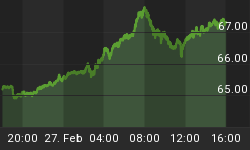Let's turn our attention to the global economy. Last week the Bank of England said it would buy 60 billion pounds of government debt in order to cushion the economy against the impact of the recent Brexit vote. England and the European Union are emulating the quantitative easing (QE) policies of the U.S. Federal Reserve but so far without any measurable success.
Meanwhile the Bank of Japan (BoJ) has begun a massive stimulus program which may already be having an effect on Japan's bond yields. There has also been talk of Japan initiating a "helicopter money" scheme whereby the BoJ would directly finance fiscal spending.
Indeed, loose money policies in England, China, and Japan are all the talk right now among investors. The attempts by the ECB, BoJ, and People's Bank at stimulating their way out of deflation have yet to show appreciable results, but this won't stop them from trying.
If nothing else, these desperate attempts at re-inflating their economies are providing support for gold, U.S. Treasuries and corporate bonds. In many countries the interest rate is negative, which means that bond investors are essentially paying the bond issuer to hold their money. As one observer put it, "Negative interest rates were unheard of a few years ago. Now they are spreading around the world like cancer."
The yield on the U.S. 10-year Treasury note is only about 1.60 percent (see chart below), but on a relative basis the U.S. is a veritable high-yield paradise in the eyes of yield-hungry investors. Along with U.S. Treasury and mortgage bonds, safe haven assets such as gold, silver and even U.S. real estate are in high demand. Gold especially is a fear-driven asset, and with growing uncertainty surrounding the economic outlook for China, Japan, the EU and other countries, gold should continue to benefit in the coming months.

Although there has been no formal crash in the European markets, euro zone bank stocks have acted as if a financial crash is underway. Consider the following graph.

As shown above, the STOXX index of 47 leading European bank stocks shed nearly 40 percent of its value from May 2015 to May 2016. Bad loans along with negative interest rates have significantly eroded the banks' profitability as illustrated in this chart.
Here's something else to consider: In 2014, IMF chief Christine Lagarde proposed that 10 percent of every saver's bank account be essentially confiscated as bail-out money, similar to what happened in Cyrus in 2013. Robert Campbell, in his latest "Campbell Real Estate Timing Letter" (www.RealEstateTiming.com) asks, "If you were a European saver, would you keep your money in a bank savings account knowing that the money could be confiscated if the bank needed capital to keep operating? Or would you think long and hard about taking your money out of the European banks and investing it in the U.S. – in stocks, bonds, or real estate – where your money is safer?"
Campbell suggests – and quite correctly, IMO – that U.S. financial markets have benefited from capital flight out of Europe and other countries. "It might seem paradoxical," he writes, "but the worse the economic situation gets in Europe, the better it could be for U.S. asset prices." The experience of the last several months argue strongly for this conclusion.
The Stock Market Cycles
For the summer months only, the book "The Stock Market Cycles" is available at a special discount to readers of this commentary. The book reveals the key to interpreting long-term stock price movement and economic performance, namely the famous Kress series of yearly cycles. This work was undertaken based on popular demand and was written in a style that casual readers and experts alike can enjoy and understand. The book covers each one of the yearly cycles in the Kress Cycle series, starting with the 2-year cycle and ending with the 120-year Grand Super Cycle.
The book also covers the K Wave and the effects of long-term inflation/deflation that these cycles exert over stock prices and the economy. Each chapter contains illustrations that show exactly how the yearly cycles influenced stock market performance and explains where the peaks and troughs of each cycle are located and how the cycles can predict future market and economic performance. Order your autographed copy today: http://www.clifdroke.com/books/Stock_Market.html















